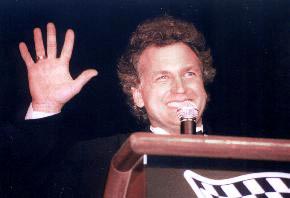|

DRO: Let's start at the beginning. How did a farm boy from Ohio
get interested in drag racing?
MT: Well, I grew up in the 1960s -- I was born in '58 -- so
in the mid- to late-60s I was very "formable," and the guys who worked
on our farm all had Chevelles and Mustangs and Cyclones and all kinds
of fast cars. And everything was loud and that was back when, to me,
drag racing was in its heyday.
And I remember when I was in sixth grade I was asked to do a paper
on my perfect day. March 15 was the date -- the numbers 3-15 ended up
being real coincidental for me as things went along -- and I wrote that
my perfect day would be to work on the farm in the morning, then I would
eat a lot and go to the racetrack. Then I drew two pictures of Funny
Cars on the back and I handed it in.
DRO: Do you remember what grade you got?
MT: Not really, but I know I did okay.
DRO: What's the 3-15 connection for you?
MT: What makes it so coincidental is that my first Funny Car
number in 1984 was 315, and I won my first Funny Car race at Darlington
on March 15, 1989. So the numbers 3-15 fall in place quite often for
significant times in my racing career. And now I'm still farming, still
eating a lot, and still racing Funny Cars, so it's been kind of a neat
thing.
DRO: How did you get started in the racing itself?
MT: In 1974 -- no, 1975 -- I bought my first car as a sophomore
in high school. It was a 1970 Nova SS that back then had only 12 or
13,000 miles on it. It was a cream puff and I paid $1,500 for it. It
was really neat, and stock, it ran 13.20s.
The three years I was in high school -- actually, I was going to adult
continuing education classes at Alliance High School -- there was an
auto shop teacher there, Ron Roudabush, who was a Competition Eliminator
racer and that's why I really wanted to go there. I learned a lot about
high-performance engines and transmissions and rear ends there, and
just the whole aspect of racing from him. The guy was a real racer and
I was pretty naive when I started at the age of 16, and I'd never had
a real mentor before as far as having someone to show me how to build
and do things. But I wanted to learn, so I went ahead and pursued that
and it was very interesting.
So, the year after I bought it, the Nova ran 11.70s after I did the
heads and worked on the cam, and pistons, and manifold, and did some
carburetion work, all of that kind of stuff. It was one of those things
that really meant a lot to me.
Those three years of continuing education were things that I really
wanted to learn, so I picked up on them. And the nice thing was that
on the farm I could apply my mechanical aptitude to rebuilding or fixing
our tractors and trucks and other pieces of equipment. I still do all
our mechanical maintenance work on the farm. I've been a hands-on guy
my whole life.
|